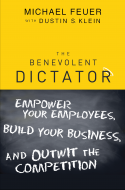Listening to a law firm administrator explain how he handles internally sensitive issues at his law firm over a business dinner one evening, I remarked, “You’re a benevolent dictator! Sounds like it’s working for you! Management by consensus may be an easier path, but it is a sure path to confusion, or worse, inaction, right?” He agreed, but added that it wasn’t for the weak of heart because it did not come easy. A few days later I was contacted by book publicist Kevin Small, requesting a review of an advance copy of a new book, The Benevolent Dictator, by Michael Feuer, co-founder of OfficeMax and founder of Max-Wellness. What a coincidence! I eagerly agreed and dove into the book with relish, hoping to glean some nuggets to be passed along to my clients and colleagues in the legal profession. I was not disappointed. I hope you’ll too find lots of encouragement and ideas. Then, share them with the readers of the VMO blog.
I hope you’ll too find lots of encouragement and ideas. Then, share them with the readers of the VMO blog.
This book is a gem. There are practical lessons that we already know but will benefit from re-visiting and others that were entirely new to me. Here’s the short list of what this book has to offer:
- Always be prepared to turn to Plan B…and sometimes C and D.
- Learn how to make every dollar last
- Manage by the three P’s: Persistence, Perspiration, and Performance
- Pot stirring 101: The key to continuous reinvention
- How to put lightning back in the bottle again and again
One of my favorite chapters.
Anyone who has a role in launching ideas in their law firm will totally relate to Chapter Six: “GOYA—The only way to really test an idea.”
“You should… begin by undertaking a process in which I’m a big believer: GOYA, or, Get Off Your Ass. …Take that idea and start testing it. …Go to places where people shop and buy. Walk around and watch how they do it. You envision how your idea would make it better, easier, and faster for people to do something that they’re currently doing poorly, with difficulty, or slowly. You see if your concept has legs.”
Now, you might argue that in the law firm it’s not about shopping and buying. And I would counter: It is! Nothing will get you to the table quicker than if you truly understand how your clients (i.e, partners, management, bosses, etc.) work in order to get them to buy into a new idea.
 Have you ever been on the line for a client’s success, been responsible to bring in a million dollars in revenue, or felt the demands on the one commodity lawyers have to sell—time? If not, before you present that new idea walk a mile in a lawyer’s shoes—it ain’t easy. How busy lawyers juggle multiple clients, stay up to date on the law, and find time to develop new business can be a herculean task! (Not to mention family, philanthropy and oh yeah, personal time.) A CEO, COO or CMO (Director, Administrator or manager–whatever your title) with an idea and only a vague concept of the impact the idea will have on the practicing lawyer is certain to be less effective. The Benevolent Dictator will inspire you!
Have you ever been on the line for a client’s success, been responsible to bring in a million dollars in revenue, or felt the demands on the one commodity lawyers have to sell—time? If not, before you present that new idea walk a mile in a lawyer’s shoes—it ain’t easy. How busy lawyers juggle multiple clients, stay up to date on the law, and find time to develop new business can be a herculean task! (Not to mention family, philanthropy and oh yeah, personal time.) A CEO, COO or CMO (Director, Administrator or manager–whatever your title) with an idea and only a vague concept of the impact the idea will have on the practicing lawyer is certain to be less effective. The Benevolent Dictator will inspire you!
When Communicating, Cut to the Chase.
“One size never fits all, and events must dictate your tactics. This means that as the boss, you must instinctively understand when to be an observer and when you must get your hands very dirty, very quickly—in order to survive, succeed, or excel.”
Assertions that start with a negative followed by a litany of unpleasant consequences will be counter productive. (Avoid being forced to focus only on the risk factors!)
“It’s certainly true that you must tell your team members what they need to know, not just what they want to hear. Sprinkling perfume on a smelly problem doesn’t make the fragrance better. …But, starting with statements like, ‘If we don’t increase sales in the next month, we might have to let go of many of you,’ or, ‘We either save money on expenses, or we go down the tubes’ …is counter productive.”
It’s common sense, but we get into bad habits. Feuer suggests that you can jump start acceptance by explaining the issue and the anticipated fix by using a logical, positive tone and focusing on the good rather than the bad. However….
“If some of your people ignored this first sweet-laced mandate, then home in on those who might need a trip to the woodshed to understand what you really meant. Target your second message to the noncompliant laggards with the old school, stronger-style message, as in, “What part of ‘no’ didn’t you understand? If all else fails…a ton of bricks will get the job done, too.”
Ah…the Benevolent Dictator! I love Feuer’s writing style and I think you will too. There’s great advice on handling crisis, growing your company (i.e. law firm), and gaining trust and respect from your employees (and your own bosses!). Seriously, I know I recommend a number of business books from time to time, but this one is a must read. Truly practical, sensible advice that everyone in the legal profession needs to read—lawyers, managing partners, marketing partners, administrators, COOs, IT, Human Resources, and of course CMOs! Do yourself a favor. READ THIS BOOK. Then come back and drop a note about a nugget you found and share the wealth!
Michael Feuer co-founded OfficeMax in 1988, starting with one store and $20,000 of his own money. During a 16-year span, Feuer, as CEO, grew the company to almost 1,000 stores worldwide with annual sales of approximately $5 billion before selling this retail giant for almost $1.5 billion in December 2003. In 2010, Feuer launched another retail concept, Max-Wellness, a first of its kind chain featuring more than 7,000 products for head-to-toe care. Feuer serves on a number of corporate and philanthropic boards and is a frequent speaker on business, marketing and building entrepreneurial enterprises. “The Benevolent Dictator,” chronicles his step-by-step strategy to build business and create wealth. Published by John Wiley & Sons in late spring 2011.
ISBN: 978-1-1180-0391-6
Hardcover/US $24.95




Russell,
It is a very interesting read. Although the writer’s business model is definitely corporate and not flat like many law firms, there are still some great lessons to be applied to the law firm business model that is currently the most common. Inclusive and organic are not words that describe the traditional model and I think it will take some brand new thinking and significant cultural shifts for the current leadership generation of law firm management to achieve. That being said, some of the newer law firms are changing the game. Thanks so much for your thoughtful comments.
Jayne